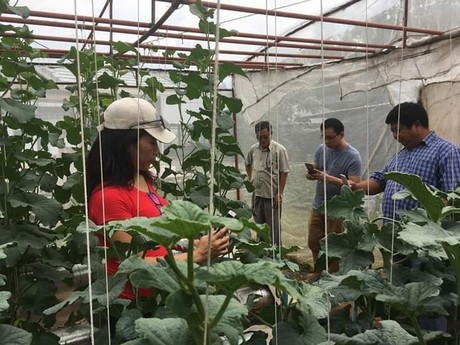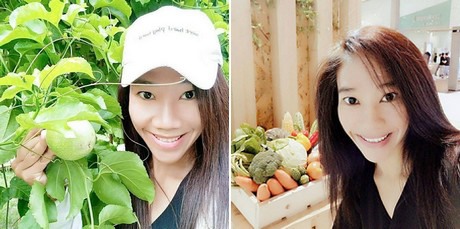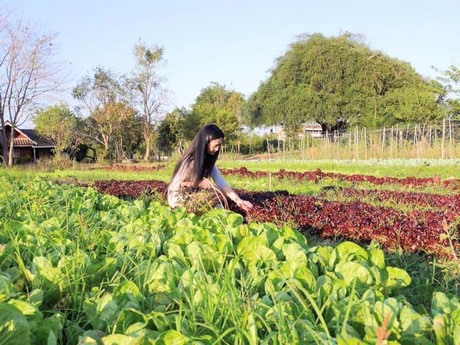Cultivating and exporting fruits and vegetables from Thailand can be a bit more challenging. Not only are some of the products hardly known over the globe, there is also room to grow in terms of growing techniques and marketing options. For this reason, Chris Petcharalum has spent most of her professional career helping out farmers in Thailand to accomplish new goals for their company.
Chris Petcharalum is a consultant in agriculture and has been active in the fruit and vegetable for close to two decades. Now, she assists farms in Thailand with their business. Her daily job consists of dealing with the cultivation, harvesting, exporting, research and development for the farms, amongst many other tasks. “If there is a producer that has new produce available for sale during the season, I will help them to promote that item to the public. I will help to setup selling price, make marketing materials, contact global buyers and even plan for the packing and shipment. I’ll start posting on B2B or Social Media websites, like LinkedIn. Before the producer will come and discuss about selling the product with my help, they will prepare records of the cultivation and harvesting, including photos, products details and prices that he/she is willing to sell the produce for. After this point, I will start to work as an outsourced export sales & marketing department for the client. This means sending offers to potential buyers and negotiate and finalize all issues in order to close the deal. Most producers here in Thailand, or my region, are very good at cultivation, but they don’t know enough about sales and marketing, export and import, they mostly don’t even speak other languages like English or use a computer, let alone the internet.”

Although she visits other people their farms mostly, Petcharalum is the owner of three farms herself, in which she tries to grow various fruits and vegetables to test cultivation techniques or just a new product she has never grown: “If I visit plantations or other peoples’ farms, I will ask about the products that I’m interested in and then try to grow them at my farms to test. At one point I was asked to set up the island in Southern Thailand to be a tropical fruit island, by mixing many kinds of fruit from north and east Thailand like durian, mangosteen, passionfruit and avocado. I had to start growing all these products by myself, otherwise I can’t explain how it grows or what problems you will face when growing them together. My farm is the best place to run tests while growing the products. However, I don’t grow them on my farm to sell them off or even export them, as I’m simply a coordinator and consultant.”

Thailand is a major player when it comes to the smelly fruits called durians. According to Petcharalum the durian, together with the mangosteen are the King and Queen of fruit in Thailand: “The popularity exists because a lot of people know the fruits and have tasted them. Still I’m selling the items that people have known about for long time as well, like coconuts, mangoes, bananas, durians, manosteen, ramburan, longan, lychee, pineapples, pomelos, tamarind, strawberries, passion fruits and more. The more we can get people educated about these fruits from Thailand, the easier it will be to export them,” Malaysia has announced to try and increase their market share when it comes to the durians, but Petcharalum isn’t worried: “People will always follow their own preferences when it comes to taste. Each origin has its own featured taste, and because of this I don’t feel they can’t co-exist. Thailand has the bigger agricultural area and China has a massive population. So we are happy that our neighbour can increase their production, while we still can sell more of our produce.”

For the future, Thailand should focus on exporting fruits and vegetables to countries that are open to their culture. “Find clients who feel happy when they try Thai products. Of course, China, EU, USA, Middle East and Asia still works for us. But lately business is harder than the past, so the countries or markets that will have less risk attached to them might be more interesting markets. We could also shift our focus in developing new varieties. My imagination is limitless, but for our organic farms we are developing a variety of new tomatoes and sweet kernel corn. We don’t have a name for them yet, but it’s on its way right now, being developed at the Khonkaen University and I hear the taste is very good!” Petcharalum concludes.
For more information:
Chris Petcharalum
Roadmap International Thailand Co., Ltd.
Tel: +66 86 844 8608
Email: roadmapthaifarmers@gmail.com
LinkedIn: www.linkedin.com/in/roadmapthaifarmers
